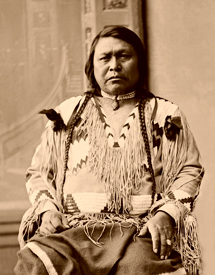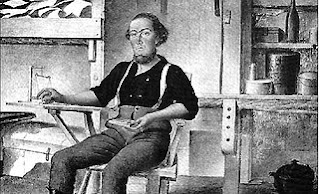Great Leader: Ouray of the Uncompahgre Ute, 1833-1880
Native leaders who won the respect of both their own people as well as Whites were rare in the West. Animosity between both sides ran too deep for each side to see the good in the other, or to allow for such personal sentiments. Some leaders commanded the respect of their White neighbors, though they did so at the cost of rousing the suspicions of their own people.
 Ouray was born in November, 1833, in what is now New Mexico. On the night of his birth, a meteor shower occurred which was seen as a good omen. The name Ouray means arrow in Ute, referring to the stars shooting across the night's sky. Ouray's father was a Jicarilla Apache who'd been adopted as a child into the Uncompahgre band. When Ouray was 27, he inherited his father's position of leadership among the Ute people. By then, he'd already born his share of personal tragedies. Ouray's first wife was a Uncompahgre woman known as Black Water. She died in childbirth to their only son, called Parso or apple because of the boy's rosy cheeks. When the child was five, he was at a buffalo hunting camp near what is now Fort Lupton, Colorado. The camp was raided by the Sioux and the boy was taken. Ouray forced himself to believe that his son was dead. The thought of his son being raised as a Sioux, the mortal enemy of the Utes, was unthinkable.
Ouray was born in November, 1833, in what is now New Mexico. On the night of his birth, a meteor shower occurred which was seen as a good omen. The name Ouray means arrow in Ute, referring to the stars shooting across the night's sky. Ouray's father was a Jicarilla Apache who'd been adopted as a child into the Uncompahgre band. When Ouray was 27, he inherited his father's position of leadership among the Ute people. By then, he'd already born his share of personal tragedies. Ouray's first wife was a Uncompahgre woman known as Black Water. She died in childbirth to their only son, called Parso or apple because of the boy's rosy cheeks. When the child was five, he was at a buffalo hunting camp near what is now Fort Lupton, Colorado. The camp was raided by the Sioux and the boy was taken. Ouray forced himself to believe that his son was dead. The thought of his son being raised as a Sioux, the mortal enemy of the Utes, was unthinkable.
Later, Ouray met a sixteen-year-old girl named Chipeta, or White Singing Bird. She had been born a Kiowa, but was captured by the Utes as a child and raised as one of them. She became a staunch ally and helpmeet of her husband, working with Ouray even in council or whenever he met with Whites. As a young man, Ouray led raids against the Kiowa and Sioux. Although at first not receptive toward discussions or settlement with Whites, he soon became friendly with individual White men. Indian Agent Felix Brunot tried to tempt Ouray into signing a treaty by telling him that he had found his long-lost son, Parso. Though Ouray and Chipeta met a young Sioux Indian when they went to Washington, D.C., he turned out not to be Parso. Despite the set-back, Ouray did sign a treaty with the White men in 1874. His doing so earned him some animosity from his own people, who believed he was too friendly with the White men.
When the United States established the White River Indian Agency, they recognized Ouray as chief of the Uncompahgre Utes. In 1880, he traveled to Washington, D.C. along with Chipeta, meeting with both President Rutherford B. Hayes as well as Ulysses S. Grant. Hayes called Ouray the most intelligent man he'd ever conversed with. Soon after this trip, in 1880, he died and was buried in Ignacio, Colorado. Later, he was buried with full honors in 1925 in Ignacio. The town and county of Ouray, in Colorado, were named in his honor. An obituary in a Denver paper called him the greatest Indian of his time, a friend to the White man and protector of the Indian, alike.
 Ouray was born in November, 1833, in what is now New Mexico. On the night of his birth, a meteor shower occurred which was seen as a good omen. The name Ouray means arrow in Ute, referring to the stars shooting across the night's sky. Ouray's father was a Jicarilla Apache who'd been adopted as a child into the Uncompahgre band. When Ouray was 27, he inherited his father's position of leadership among the Ute people. By then, he'd already born his share of personal tragedies. Ouray's first wife was a Uncompahgre woman known as Black Water. She died in childbirth to their only son, called Parso or apple because of the boy's rosy cheeks. When the child was five, he was at a buffalo hunting camp near what is now Fort Lupton, Colorado. The camp was raided by the Sioux and the boy was taken. Ouray forced himself to believe that his son was dead. The thought of his son being raised as a Sioux, the mortal enemy of the Utes, was unthinkable.
Ouray was born in November, 1833, in what is now New Mexico. On the night of his birth, a meteor shower occurred which was seen as a good omen. The name Ouray means arrow in Ute, referring to the stars shooting across the night's sky. Ouray's father was a Jicarilla Apache who'd been adopted as a child into the Uncompahgre band. When Ouray was 27, he inherited his father's position of leadership among the Ute people. By then, he'd already born his share of personal tragedies. Ouray's first wife was a Uncompahgre woman known as Black Water. She died in childbirth to their only son, called Parso or apple because of the boy's rosy cheeks. When the child was five, he was at a buffalo hunting camp near what is now Fort Lupton, Colorado. The camp was raided by the Sioux and the boy was taken. Ouray forced himself to believe that his son was dead. The thought of his son being raised as a Sioux, the mortal enemy of the Utes, was unthinkable. Later, Ouray met a sixteen-year-old girl named Chipeta, or White Singing Bird. She had been born a Kiowa, but was captured by the Utes as a child and raised as one of them. She became a staunch ally and helpmeet of her husband, working with Ouray even in council or whenever he met with Whites. As a young man, Ouray led raids against the Kiowa and Sioux. Although at first not receptive toward discussions or settlement with Whites, he soon became friendly with individual White men. Indian Agent Felix Brunot tried to tempt Ouray into signing a treaty by telling him that he had found his long-lost son, Parso. Though Ouray and Chipeta met a young Sioux Indian when they went to Washington, D.C., he turned out not to be Parso. Despite the set-back, Ouray did sign a treaty with the White men in 1874. His doing so earned him some animosity from his own people, who believed he was too friendly with the White men.
When the United States established the White River Indian Agency, they recognized Ouray as chief of the Uncompahgre Utes. In 1880, he traveled to Washington, D.C. along with Chipeta, meeting with both President Rutherford B. Hayes as well as Ulysses S. Grant. Hayes called Ouray the most intelligent man he'd ever conversed with. Soon after this trip, in 1880, he died and was buried in Ignacio, Colorado. Later, he was buried with full honors in 1925 in Ignacio. The town and county of Ouray, in Colorado, were named in his honor. An obituary in a Denver paper called him the greatest Indian of his time, a friend to the White man and protector of the Indian, alike.



Comments
Post a Comment